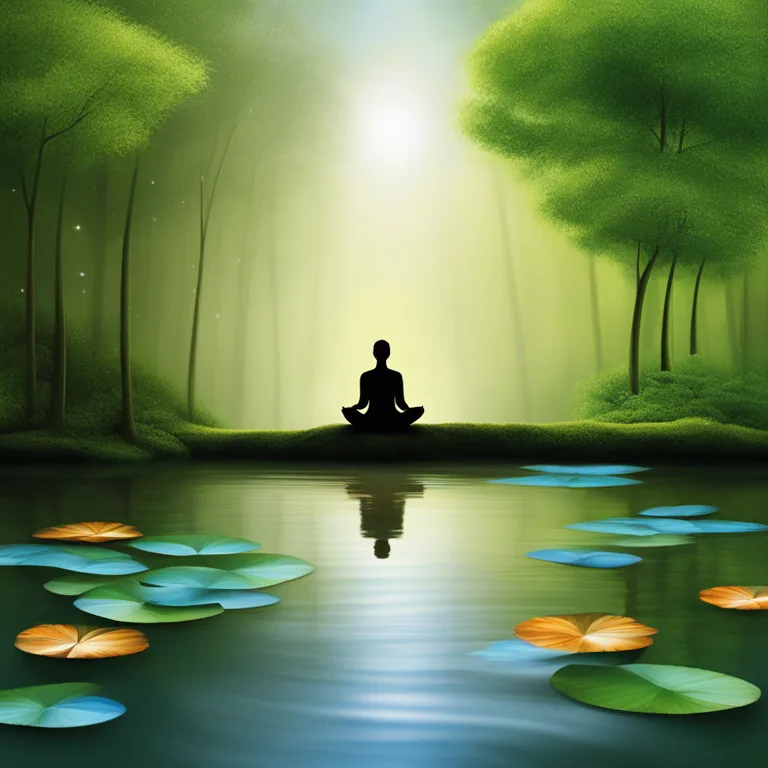
The 21 Stages of Meditation
Delve into the progressive journey of mind and spirit through the 21 stages of meditation. A guide for practitioners seeking deeper insight.
article by Hina Kurosawa
Introduction to Meditation Stages
Meditation is a nuanced practice with numerous techniques and countless benefits. While the essence of meditation is simplicity—often merely focusing on the breath or a mantra—it unfolds in a series of stages or levels that guide a practitioner from novice to adept. The concept of mapping out a meditative journey into 21 distinct stages is one way to understand the depth and progression of this practice. As we move through the stages, each represents a deeper level of self-awareness and spiritual evolution that can be integrated into daily practice.

Beginnings: Setting Intentions
The first stage of meditation is about setting intentions. It’s crucial to know why you are meditating—whether for stress relief, spiritual growth, or as a means to enhance focus and creativity. Clear intentions act as a compass throughout the meditative journey, steering practitioners through the ebbs and flows of their internal landscape.

Establishing Focus
As we enter the second stage, establishing focus becomes key. This stage involves sharpening concentration, often by engaging with a focal point such as the breath or a visual object. It teaches the mind to remain anchored, not carried away by thoughts or external stimuli—building the foundation for deeper meditative work.

Deepening Relaxation
Meditation is synonymous with relaxation, but deepening this state is a distinct stage. Here, practitioners learn to release tension not only in the body but also on a mental level. This profound relaxation opens the door to heightened sensory awareness and a newfound sense of calm that pervades one's being.

Cultivating Mindfulness
Stage four encompasses mindfulness—a nonjudgmental observation of the present moment. Practicing mindfulness within meditation encourages a gentle awareness of one’s thoughts, emotions, and sensations, fostering a deeper connection with the self and the surrounding world.
Developing Concentration
As the journey continues, the ability to develop concentration intensifies. This stage is about building on the initial focus, honing the mind's ability to stay absorbed in meditation for extended periods. This skill is crucial for deeper exploration and insight.
Exploring the Subconscious
Within the sixth stage, meditation becomes a means of exploring the subconscious. The practice introduces techniques to delve into deeper levels of the psyche, uncovering patterns, memories, and insights that often escape conscious awareness.
Awakening Inner Energy
At this pivotal stage, practitioners might start to awaken their inner energy—often referred to as 'Kundalini' in certain traditions. This energy, believed to be stored at the base of the spine, can lead to profound energetic sensations and a feeling of enhanced vitality when activated.
Embarking on Self-Discovery
Meditation brings about an inner journey of self-discovery. At stage eight, the meditator begins to gain deeper insight into their personal beliefs, ego structures, and the nature of the self. This critical reflection is vital for personal growth and spiritual development.
Attaining Equanimity
The ninth stage is about attaining a state of equanimity, where one reaches a balanced mind that remains undisturbed by the dualities of life. Here, the practitioner learns to maintain inner peace regardless of external circumstances, benefiting from a profound cognitive and emotional stability.
Experiencing Joy
Stage ten involves the cultivation of pure joy and contentment within meditation. This stage transcends external sources of happiness, drawing from an inexhaustible inner wellspring. It marks the beginning of an experience where one's practice starts giving back a sense of bliss and fulfillment.
Transformation through Insight
The journey through meditation leads to transformative insights. As practitioners advance, each session has the potential to bring about life-altering realizations, reshaping perceptions and leading to a more compassionate and understanding view of the world.
Integration of Experiences
Beyond personal insights, stage twelve is about integrating these experiences into daily life. Meditation is not solely an isolated practice but a lifestyle where its principles actively inform one's choices and interactions with others, leading to harmonious living.
Ongoing Reflection
Continual reflection is key in the thirteenth stage. Even experienced practitioners must regularly assess their meditation journey, ensuring that they remain aligned with their intentions and open to growth and changes as their practice evolves.
Expanding Awareness
As one approaches stage fourteen, expanding awareness becomes paramount. This stage is about transcending the individual self and sensing a unity with the broader consciousness. This expansion often brings about a sense of oneness with all of existence, dissolving feelings of separateness.
Nurturing Compassion
The fifteenth stage of meditation deepens practitioners' empathy and compassion. By consistently connecting with inner tranquility and expansive awareness, the heart opens to a more profound love for oneself and others, fostering a genuine desire to alleviate suffering.
Attaining Stillness
Reaching a state of stillness is an essential milestone. In this stage, the practitioner experiences a tranquil mind untouched by the chaos of thoughts and emotions. This stillness does not denote inactivity but a dynamic silence that energizes and revitalizes.
Embracing Wisdom
True wisdom, as presented in stage seventeen, is an emergent property of deep meditation. This wisdom is characterized by an intuitive understanding that goes beyond intellectual knowledge, illuminating the path for both personal and spiritual decision-making.
Surrendering to the Flow
This stage is about surrender, a letting go of resistance to the natural flow of life. It is in surrender that meditators often find the greatest freedom, as they learn to ride the waves of existence with grace and trust in the greater unfolding of life’s narrative.
Realizing Non-Duality
In advanced stages such as the nineteenth, the concept of non-duality, or Advaita, becomes an experiential reality. Here, the illusion of separation between self and other dissipates, leading to an enlightened understanding of unity.
Living in Presence
Living in the present moment—fully and consistently—is the focus of the twentieth stage of meditation. This profound presence becomes a natural state, where the future and past lose their grip, and life is experienced in its immediate, vibrant reality.
Ultimate Liberation
Finally, the twenty-first stage is associated with ultimate liberation or enlightenment. This stage marks the pinnacle of the meditative journey, characterized by a permanent shift in consciousness and freedom from all forms of mental suffering—a state of being where inner peace is unshakeable.
Published: 12/20/2023
Modified: 12/20/2023
More predictions
Come back here soon to learn more about yourself and your future


Hone Focus with Mindful Meditation
Discover meditation techniques that sharpen concentration and elevate mental clarity for a more productive life.


Korean Meditation Practices for Serenity
Discover the transformative power of traditional Korean meditation techniques and enhance your mental tranquility.


Boost Concentration with Meditation Techniques
Discover effective meditation strategies to enhance focus and concentration in daily life.